最新高中英语《情态动词》ppt课件
合集下载
情态动词全部ppt课件

16
Some festivals are held to satisfy the ancestors, who might return either to help or to do harm.
推测
17
--- Excuse me. Is this the right way to the Summer Palace?
3. will/would
1. 表示意愿,will表示现在的意愿, would表示过去的意愿。
I will stick to my plan though all of you are against it.
I told him to give up smoking, but he wouldn’t
3. During the vacation, he would visit me
every four days.
过去的习惯
4. Will / Would you pass me the ball,
please?
请求
习惯,倾向 5. Birds will fly to the south in the winter. 24
You can go with them if you like.
--- Could/Can I have a look at your new design? --- Yes, of course you can.
(注意此处答语不能用could)
8
3)用在肯定句中,表示_客__观__上__有__可_ 能 Anybody can make mistakes. Driving on the snowy roads can be very dangerous.
Some festivals are held to satisfy the ancestors, who might return either to help or to do harm.
推测
17
--- Excuse me. Is this the right way to the Summer Palace?
3. will/would
1. 表示意愿,will表示现在的意愿, would表示过去的意愿。
I will stick to my plan though all of you are against it.
I told him to give up smoking, but he wouldn’t
3. During the vacation, he would visit me
every four days.
过去的习惯
4. Will / Would you pass me the ball,
please?
请求
习惯,倾向 5. Birds will fly to the south in the winter. 24
You can go with them if you like.
--- Could/Can I have a look at your new design? --- Yes, of course you can.
(注意此处答语不能用could)
8
3)用在肯定句中,表示_客__观__上__有__可_ 能 Anybody can make mistakes. Driving on the snowy roads can be very dangerous.
《情态动词》PPT课件
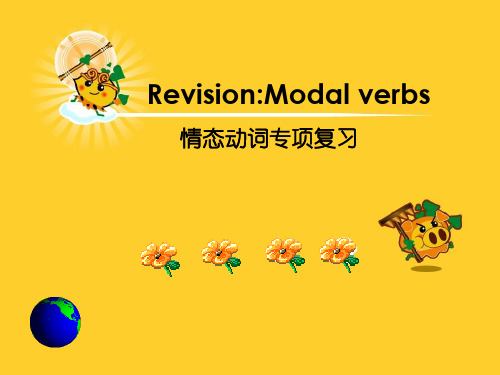
work our this problem. 如果你睡个好觉,那么你就能做出这个题目。 3、表示过去的能力: could表示过去一般的能力, 但不表示做或未做某事;
was/ were able to表示过去有能力并且成功地做了某事, 相当于managed to do something/ succeeded in doing something;
• Mr. Bush is on time for everything. How can it be that he was late for the opening ceremony? (表疑惑、惊讶)
表示请求、允许、允诺
1. 当对方是决策者时,你代表你(们)自己(I, We),或代表第三者(he,she,they)向对方 (you)请示或提出建议时用:
Revision:Modal verbs
情态动词专项复习
How many modal verbs
do you remember?
(情态动词)
一,常见的情态动词有:can, could, may, might ,must, shall, should, will, would, need, have to等
4、具有情态动词的某些特征的有:have(had) to, used to.
情态动词的特征
1、有一定的词义,但不能单独作谓语,它们要和行 为动词或连系动词连用,构成谓语。
2、适用于主语的各种人称和数 have to例外,主语 是第三人称单数时,要用has to)。如:
We/ He must work hard. 我们/他一定要努力工作。 I have to walk home. 我得步行回家。 He has to walk home. 他得步行回家。
was/ were able to表示过去有能力并且成功地做了某事, 相当于managed to do something/ succeeded in doing something;
• Mr. Bush is on time for everything. How can it be that he was late for the opening ceremony? (表疑惑、惊讶)
表示请求、允许、允诺
1. 当对方是决策者时,你代表你(们)自己(I, We),或代表第三者(he,she,they)向对方 (you)请示或提出建议时用:
Revision:Modal verbs
情态动词专项复习
How many modal verbs
do you remember?
(情态动词)
一,常见的情态动词有:can, could, may, might ,must, shall, should, will, would, need, have to等
4、具有情态动词的某些特征的有:have(had) to, used to.
情态动词的特征
1、有一定的词义,但不能单独作谓语,它们要和行 为动词或连系动词连用,构成谓语。
2、适用于主语的各种人称和数 have to例外,主语 是第三人称单数时,要用has to)。如:
We/ He must work hard. 我们/他一定要努力工作。 I have to walk home. 我得步行回家。 He has to walk home. 他得步行回家。
高中英语 情态动词用法归纳全.ppt

更多的时态。
I’ll not be able to come this afternoon. 当表示“经过努力才得以做成功某事”时应用be able
to,不能用Can。如:
He was able to go to the party yesterday evening in spite of the heavy rain.
can 表示能力,意为 “能 会” 表示推测, 意为 “可能”, 常用于否定句和疑问句中 表示请求, 允许, 意为“可以”
could can 的过去式,意为“能、会”, 表示过去的能力 在疑问句中表示委婉请求
may 表示请求、许可,意为“可以” 表示推测,常用于肯定句中,意为“可能、也许”
might may的过去式 表示推测,常用于肯定句中,意为“ 可能、也许 ”
Can this be true? This can’t be done by him. How can this be true?
二、 may, might
1) 表示请求和允许。might比 may语气更委婉,而不是过去式。 否定回答时可用can’t 或mustn’t,表示“不可以,禁止”。
----Might/ May I smoke in this room? ---- No, you mustn’t. ---- May/Might I take this book out of the room? ---- Yes, you can. (No, you can’t / mustn’t. ) 用May I...?征徇对方许可时比较正式和客气,而用Can I...?在
2) 表示劝告、建议和命令。should, ought to可通用,但在疑 问句中常用should。
I’ll not be able to come this afternoon. 当表示“经过努力才得以做成功某事”时应用be able
to,不能用Can。如:
He was able to go to the party yesterday evening in spite of the heavy rain.
can 表示能力,意为 “能 会” 表示推测, 意为 “可能”, 常用于否定句和疑问句中 表示请求, 允许, 意为“可以”
could can 的过去式,意为“能、会”, 表示过去的能力 在疑问句中表示委婉请求
may 表示请求、许可,意为“可以” 表示推测,常用于肯定句中,意为“可能、也许”
might may的过去式 表示推测,常用于肯定句中,意为“ 可能、也许 ”
Can this be true? This can’t be done by him. How can this be true?
二、 may, might
1) 表示请求和允许。might比 may语气更委婉,而不是过去式。 否定回答时可用can’t 或mustn’t,表示“不可以,禁止”。
----Might/ May I smoke in this room? ---- No, you mustn’t. ---- May/Might I take this book out of the room? ---- Yes, you can. (No, you can’t / mustn’t. ) 用May I...?征徇对方许可时比较正式和客气,而用Can I...?在
2) 表示劝告、建议和命令。should, ought to可通用,但在疑 问句中常用should。
情态动词-完整版PPT课件
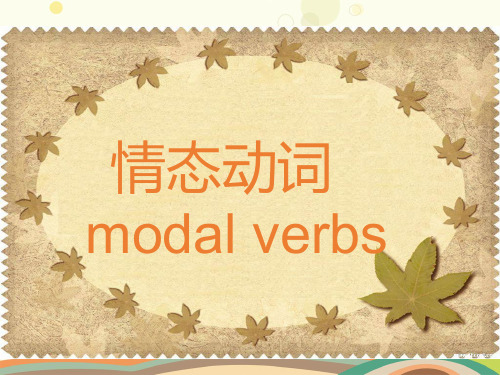
情态动词 modal verbs
1.情态动词的用法特点
1)情态动词 除 ought 和 have 外,后面只能 接不带to 的不定式。 2)情态动词没有人称,数的变化,即情态动 词第三人称单数不加-s。 3)情态动词没有非谓语形式,即没有不定式, 分词等形式。
can could may might shall should must will would ought to
have to dare need used to
表示推测
情态动词
不表示推测
2.表示推测——情态动词的重要用法.
情态动词
对将来
对现在
对过去
m肯ust/定sho的uld 推测
+ V. + V. + have done
常见must be + be doi定的推测 can’t, couldn’t
疑问的推测
can, could
+ V.
+ V.
+ have done
+ be doing
可以用not表示“可能不”
+V.
+ V.
+ have done
+ be doing
+ V.
+ V.
+ have done
+ be doing
不同的“肯定”程度可按下列层次排列: He is at home. (事实) He must be at home.(非常肯定的推断) He ought to be at home.(很可能) He could be at home.(很可能) He may be at home.(仅仅可能而已) He might be at home.(或许, 非常不确定) He might not be at home.(也许不在家) He may not be at home. (比might可能) He couldn’t be at home.(很可能不在家) He can’t be at home.(一定不在家)
1.情态动词的用法特点
1)情态动词 除 ought 和 have 外,后面只能 接不带to 的不定式。 2)情态动词没有人称,数的变化,即情态动 词第三人称单数不加-s。 3)情态动词没有非谓语形式,即没有不定式, 分词等形式。
can could may might shall should must will would ought to
have to dare need used to
表示推测
情态动词
不表示推测
2.表示推测——情态动词的重要用法.
情态动词
对将来
对现在
对过去
m肯ust/定sho的uld 推测
+ V. + V. + have done
常见must be + be doi定的推测 can’t, couldn’t
疑问的推测
can, could
+ V.
+ V.
+ have done
+ be doing
可以用not表示“可能不”
+V.
+ V.
+ have done
+ be doing
+ V.
+ V.
+ have done
+ be doing
不同的“肯定”程度可按下列层次排列: He is at home. (事实) He must be at home.(非常肯定的推断) He ought to be at home.(很可能) He could be at home.(很可能) He may be at home.(仅仅可能而已) He might be at home.(或许, 非常不确定) He might not be at home.(也许不在家) He may not be at home. (比might可能) He couldn’t be at home.(很可能不在家) He can’t be at home.(一定不在家)
高中英语《情态动词》ppt课件
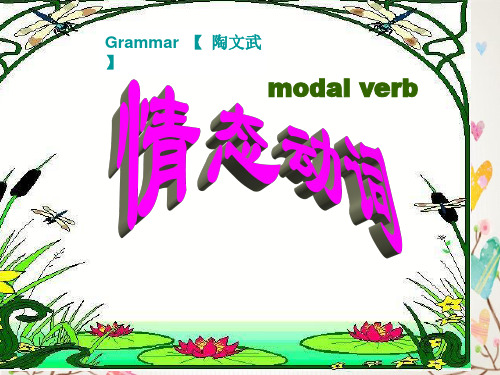
表示推测——情态动词的重要用法.
情态动词
对将来
肯定的推测
+ V.
must 常见must be
对现在
对过去
+ V.
+ have done
+ be doing
可能的推测
may!! might
否定的推测
can’t!! couldn’t
疑问的推测
can!! could
+ V.
+ V.
+ have done
三.Must +have done 表示对过去发生的事情作出的肯 定判断
它们在玩篮球!! 它们一定完成了作业??
They are playing basketball!! they must have finished their homework. 路是湿的??昨天晚上一定下雨了??
The road is wet. It must have rained last night.
She couldn’t have been at home.
三. can/could have done “本可以!!本来可能已经”用 于肯定句中!!表示对过去发生的事情做出的判断!!
您本来可以考的更好?? You could have had a better mark.
may/might
一.May/might表示推测时!!只能用于陈述句!!表示对现 在或将来要发生的动作把握不大?? 它们明天可能会到这里来??
It can’t be true! I don’t believe it.
When you are quite sure about something!! you
高考英语情态动词课件(共21张PPT)
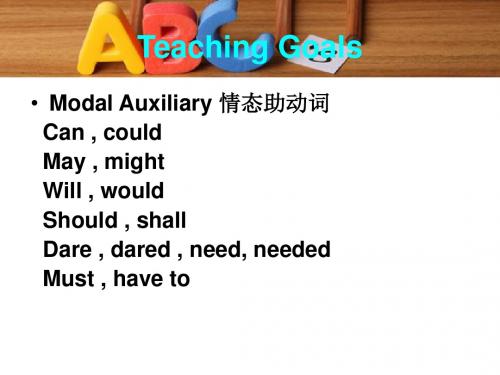
He shall get his money.
5)Should 表示说话人的惊奇、愤怒、失望等特殊情感 It’s surprising that Mary should love such a person as Jack. It’s strange that … It’s unthinkable that … I’m sorry that…
肯定疑问 Dare we run? 句
Do we dare (to) run?
否定疑问 Dare he not run? Doesn’t he dare to run ? 句
Need, needed
Need /needed
1、情态动词用于否定句,疑问句 He needn’t worry about it.
This will be the house you're looking for .
Will , would
5)would常用于虚拟条件句,表示与事实相反或不太可能实现的情况 But for your help we would have been late .
6) Would 表示过去的习惯性动作或某人的一典型动作,又使人厌烦的感 觉。 He would go swimming in summer when he was in the countryside.
3.表示请求和允许,与may同义,相当于be allowed to.常用语口语中。 You can smoke in this room. Could I borrow you dictionary?
Can , could
4.用于一些固定句型 a. Cannot ( can never) …too…怎么也不过分
如询问某种可能时,应用can。 He must know my address. (一定) He can’t know my address. (一定不) Can he know my address? (询问可能性)
5)Should 表示说话人的惊奇、愤怒、失望等特殊情感 It’s surprising that Mary should love such a person as Jack. It’s strange that … It’s unthinkable that … I’m sorry that…
肯定疑问 Dare we run? 句
Do we dare (to) run?
否定疑问 Dare he not run? Doesn’t he dare to run ? 句
Need, needed
Need /needed
1、情态动词用于否定句,疑问句 He needn’t worry about it.
This will be the house you're looking for .
Will , would
5)would常用于虚拟条件句,表示与事实相反或不太可能实现的情况 But for your help we would have been late .
6) Would 表示过去的习惯性动作或某人的一典型动作,又使人厌烦的感 觉。 He would go swimming in summer when he was in the countryside.
3.表示请求和允许,与may同义,相当于be allowed to.常用语口语中。 You can smoke in this room. Could I borrow you dictionary?
Can , could
4.用于一些固定句型 a. Cannot ( can never) …too…怎么也不过分
如询问某种可能时,应用can。 He must know my address. (一定) He can’t know my address. (一定不) Can he know my address? (询问可能性)
高中英语 H__情态动词课件 新人教版必修4

3) must+ v
He must be at the library.
can’t+ v
第十页,共86页。
4) Must用语肯定句中表示“偏偏”。 Naturally, after I told her what to do, my daughter
must go and do the opposite. 自然地,在我交代女儿做什么之后,她偏偏要做相反
Whenever we were in the country, we
_____w_o_u_l_d____play hide-and-seek in the fields.
2.表示过去的状态,只能用 used to,不可用would。例 如:
There ____________ be a park.
of our hotel that payment ____ be made in
cash.
A、shall B、need
A C、will D、can
第二十页,共86页。
8. shall / should/ ought to
shall
1)What shall we do now?
Shall she come right now?
第十二页,共86页。
B She is a bit shy and _____ stand up and
answer the teacher's questions.
A.dares not
B.doesn't dare to
C.dare not to
D.dares not to
I wonder how he _A__ to his father like
高中英语情态动词课件
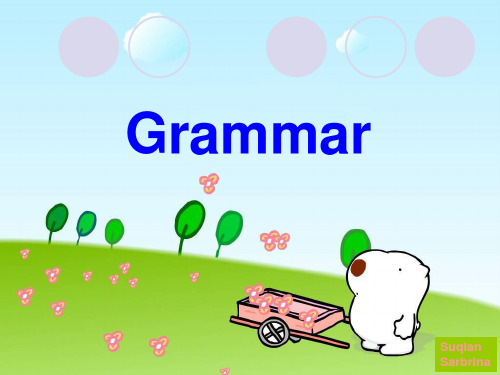
2) 情态动词没有人称,数的变化,但有些 情态动词,如can、will也有一般式和过去式 的变化。 3) 情态动词的“时态”形式并不是时间区 别的主要标志,不少情况下,情态动词的现 在式形式和过去式形式都可用来表示现在时 间、过去时间和将来时间。
二.情态动词的语法功能
(1). We use modal verbs to talk about:
May I go home now?
It may be true. She may come tomorrow. He might have some fever.
表示可能性的推测,译为 “大概,可能”用might 时显得更加不肯定
May you succeed!
用于祈使句表示祝愿
May you have many more days as happy as this one!
It’s 4:30,They should be in New York by now.
常规、常理的推测(正常情况下)按理应该
He ought to succeed, as he is so diligent. It is strange that it should be so hot today.
Drill(小练)
--- What’s the name?
--- Khulaifi. _______ I spell that for you?
A. Shall
B. Would
C. Can
D. Might
(10江苏)
—I haven’t got the reference book yet, but I’ll have a test on the subject next month.
二.情态动词的语法功能
(1). We use modal verbs to talk about:
May I go home now?
It may be true. She may come tomorrow. He might have some fever.
表示可能性的推测,译为 “大概,可能”用might 时显得更加不肯定
May you succeed!
用于祈使句表示祝愿
May you have many more days as happy as this one!
It’s 4:30,They should be in New York by now.
常规、常理的推测(正常情况下)按理应该
He ought to succeed, as he is so diligent. It is strange that it should be so hot today.
Drill(小练)
--- What’s the name?
--- Khulaifi. _______ I spell that for you?
A. Shall
B. Would
C. Can
D. Might
(10江苏)
—I haven’t got the reference book yet, but I’ll have a test on the subject next month.
- 1、下载文档前请自行甄别文档内容的完整性,平台不提供额外的编辑、内容补充、找答案等附加服务。
- 2、"仅部分预览"的文档,不可在线预览部分如存在完整性等问题,可反馈申请退款(可完整预览的文档不适用该条件!)。
- 3、如文档侵犯您的权益,请联系客服反馈,我们会尽快为您处理(人工客服工作时间:9:00-18:30)。
___________________________ _______________________
2.Must +be doing/do 表示对现在的动作进行肯定推测
他现在一定在看小说 He must be reading novels now. 他们买了一辆新车。 他们一定很有钱
They have bought a new car. They must have a lot of money.
It can’t be Mary. She has fallen ill. 她不可能在说谎。 She couldn’t be telling lies.
___________________________ _______________________
2. can/could have done 对过去发生行为的可能性进行 推测: 刚才我还看见他了, 所以他不可能出国的。 I saw him just now so he couldn’t have gone abroad. 门是锁着的, 所以她不可能在家。
eg. He used to be a quiet boy. ( √ )
He would be a quiet boy. ( × )
___________________________ __________Байду номын сангаас____________
高考链接
1. ---- Will you go skating with me this winter vacation?
---- It _B__ . ( 2002上海)
A. all depended
B. all depends
___________________________ _______________________
3.might/may have done,表示对过去发生的动作进行 可能性推测,
他可能去医务室了。 He may have gone to the clinic. 他可能已经从报纸上知道这个消息了。 He might have read about the news in the newspaper.
___________________________ _______________________
3.Must +have done 表示对过去发生的事情作出的肯定 判断
他们在玩篮球, 他们一定完成了作业。
They are playing basketball, they must have finished their homework. 路是湿的。昨天晚上一定下雨了。 The road is wet. It must have rained last night.
___________________________ _______________________
can/could
1. can /could 表示推测时,只能用在否定句或疑问句 中。
It’s so late. Can Tom be reading? 这么晚了,汤姆还在看书吗?
这个人不可能是玛丽, 她生病了。
Grammar ( 陶文武 )
modal verb
___________________________ _______________________
情态动词有一定的意义,但没有人称和数的 变化,不能独立使用,它和后面的动词构成 谓语.
只作情态动词的 can/could, may/might, ought to, must
The door was locked. She couldn’t have been at home.
___________________________ _______________________
3. can/could have done “本可以,本来可能已经”用 于肯定句中,表示对过去发生的事情做出的判断,
___________________________ _______________________
will/would
Will /Would you do…? 表请求 表意志,愿望,决心 would表过去反复发生得动作或某种倾向
“总是,总要” used to表过去常常(现在已没有这种习惯)
“过去常常” used to 可于状态动词连用 would不可以
他们可能还在等我们呢。 They may be still waiting for us. 2.might 可用于指过去的行为或者表示可能性更小。 他也许在作功课吧。
He might be doing his homework now. 我问他我是否可以离开。 I asked him if I might leave. I asked him “May I leave now?”
你本来可以考的更好。 You could have had a better mark.
may/might
1.May/might表示推测时,只能用于陈述句,表示对现 在或将来要发生的动作把握不大。 她们明天可能会到这里来。
They may come here tomorrow.
___________________________ _______________________
可情态可实义的 need, dare/dared 可情态可助动词的 shall/should, will/would 相当于情态动词的 have to, used to
___________________________ _______________________
Must , can/could, may/might 的用法 must 1.Must 表示推测时, 只能用于肯定句。 这个电脑肯定出了问题。 There must be something wrong with the computer. 你努力学了一整天, 一定累了吧 You have worked hard all day. You must be tired.
2.Must +be doing/do 表示对现在的动作进行肯定推测
他现在一定在看小说 He must be reading novels now. 他们买了一辆新车。 他们一定很有钱
They have bought a new car. They must have a lot of money.
It can’t be Mary. She has fallen ill. 她不可能在说谎。 She couldn’t be telling lies.
___________________________ _______________________
2. can/could have done 对过去发生行为的可能性进行 推测: 刚才我还看见他了, 所以他不可能出国的。 I saw him just now so he couldn’t have gone abroad. 门是锁着的, 所以她不可能在家。
eg. He used to be a quiet boy. ( √ )
He would be a quiet boy. ( × )
___________________________ __________Байду номын сангаас____________
高考链接
1. ---- Will you go skating with me this winter vacation?
---- It _B__ . ( 2002上海)
A. all depended
B. all depends
___________________________ _______________________
3.might/may have done,表示对过去发生的动作进行 可能性推测,
他可能去医务室了。 He may have gone to the clinic. 他可能已经从报纸上知道这个消息了。 He might have read about the news in the newspaper.
___________________________ _______________________
3.Must +have done 表示对过去发生的事情作出的肯定 判断
他们在玩篮球, 他们一定完成了作业。
They are playing basketball, they must have finished their homework. 路是湿的。昨天晚上一定下雨了。 The road is wet. It must have rained last night.
___________________________ _______________________
can/could
1. can /could 表示推测时,只能用在否定句或疑问句 中。
It’s so late. Can Tom be reading? 这么晚了,汤姆还在看书吗?
这个人不可能是玛丽, 她生病了。
Grammar ( 陶文武 )
modal verb
___________________________ _______________________
情态动词有一定的意义,但没有人称和数的 变化,不能独立使用,它和后面的动词构成 谓语.
只作情态动词的 can/could, may/might, ought to, must
The door was locked. She couldn’t have been at home.
___________________________ _______________________
3. can/could have done “本可以,本来可能已经”用 于肯定句中,表示对过去发生的事情做出的判断,
___________________________ _______________________
will/would
Will /Would you do…? 表请求 表意志,愿望,决心 would表过去反复发生得动作或某种倾向
“总是,总要” used to表过去常常(现在已没有这种习惯)
“过去常常” used to 可于状态动词连用 would不可以
他们可能还在等我们呢。 They may be still waiting for us. 2.might 可用于指过去的行为或者表示可能性更小。 他也许在作功课吧。
He might be doing his homework now. 我问他我是否可以离开。 I asked him if I might leave. I asked him “May I leave now?”
你本来可以考的更好。 You could have had a better mark.
may/might
1.May/might表示推测时,只能用于陈述句,表示对现 在或将来要发生的动作把握不大。 她们明天可能会到这里来。
They may come here tomorrow.
___________________________ _______________________
可情态可实义的 need, dare/dared 可情态可助动词的 shall/should, will/would 相当于情态动词的 have to, used to
___________________________ _______________________
Must , can/could, may/might 的用法 must 1.Must 表示推测时, 只能用于肯定句。 这个电脑肯定出了问题。 There must be something wrong with the computer. 你努力学了一整天, 一定累了吧 You have worked hard all day. You must be tired.
